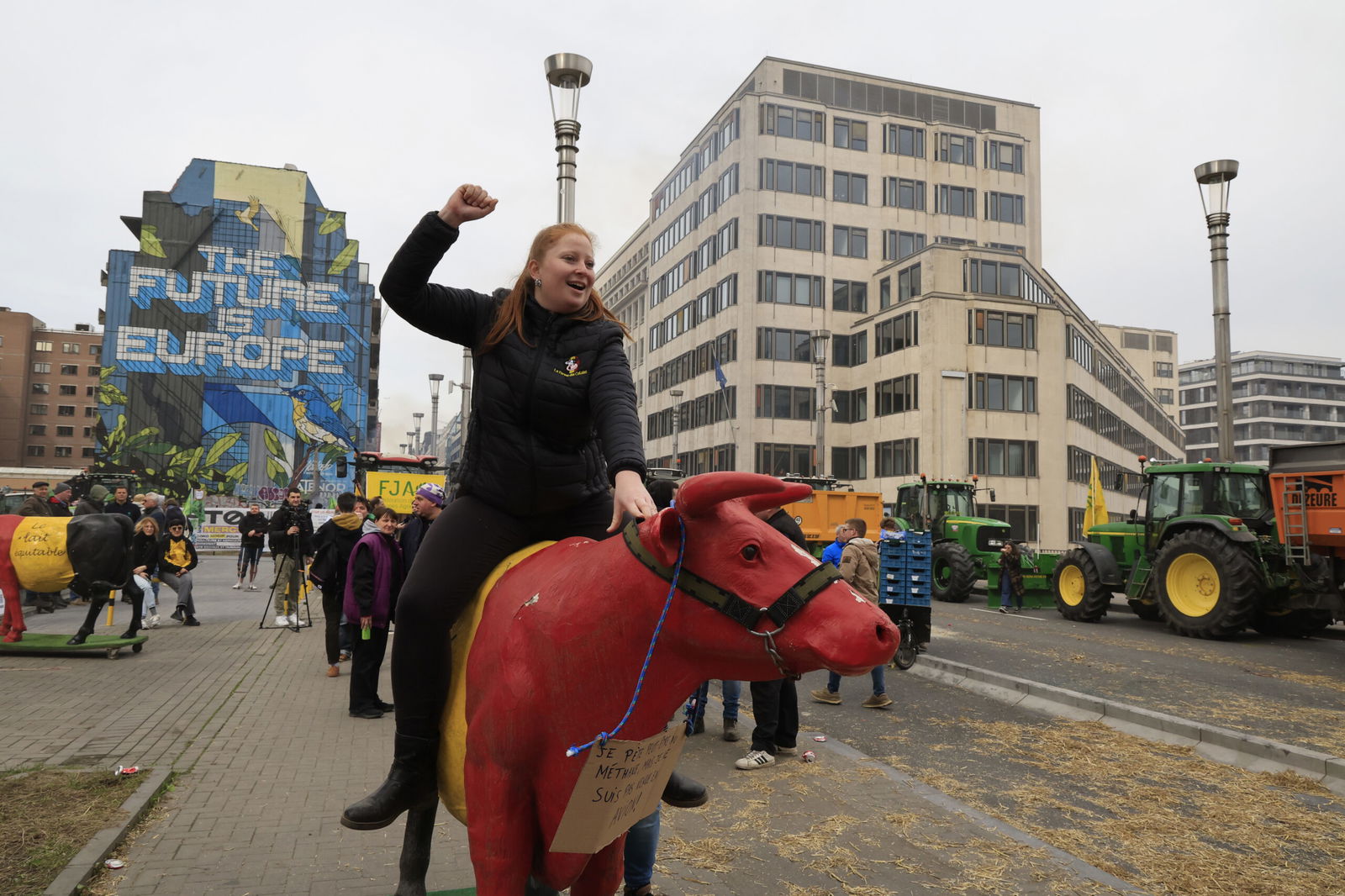Around the World briefs

By Associated Press
Spraying manure and throwing beets, farmers in tractors again block Brussels to protest EU policies
BRUSSELS | Farmers threw beets, sprayed manure at police and set hay alight on Tuesday as hundreds of tractors again sealed off streets close to the European Union headquarters, where agriculture ministers sought to ease a crisis that has led to months of protests across the 27-member bloc.
The farmers protested what they see as excessive red tape and unfair trading practices as well as increased environmental measures and cheap imports from Ukraine. “Let us make a living from our profession,” read one billboard on a tractor blocking a main thoroughfare littered with potatoes, eggs and manure.
As the protests turned into violence again, police used tear gas and water cannons to keep farmers and some 250 tractors at bay, even as ministers met to push through measures meant to calm the crisis. Authorities asked commuters to stay out of Brussels and work from home as much as possible.
Farmers, police and firefighters all had to nurse injuries, but none were life-threatening. The government lambasted the farmers for failing to contain violent elements that threw e-bikes off a bridge and set the entry to a subway station aflame.
“The violence, arson and destruction during the protests are unacceptable,” said Interior Minister Annelies Verlinden and insisted the guilty would be prosecuted.
With protests taking place from Finland to Greece, Poland and Ireland, the farmers have already won concessions from EU and national authorities, from a loosening of controls on farms to a weakening of pesticide and environmental rules.
A major EU plan to better protect nature in the 27-nation bloc and fight climate change was indefinitely postponed Monday, underscoring how the protests have had a deep influence on politics.
“In order to have a strong Europe, there is a need for a strong agriculture. So we are here to remind them that their farmers should be a priority,” said Belgian farmer Yolin Targé. “We have to deal with a lot of administrative tasks. We have to deal with a lot of environmental restrictions. We are in favor of doing our best for the environment, but still, agriculture should be a priority.”
EU member states on Tuesday gave their provisional blessing to proposals that amount to weakening or cutting rules in areas like crop rotation, soil cover protection and tillage methods. Small farmers, representing about two-thirds of the workforce and the most active in the protest movement, will be exempt from some controls and penalties.
The EU parliament is expected to decide on the proposals in late April.
Environmentalists and climate activists say the change in EU policies under the pressure of farmers is regrettable. They say the short-term concessions will come to haunt the bloc in a generation when climate change will hit the continent even harder.
Politically, the bloc has moved to the right over the past year. The plight of farmers has become a rallying cry for populists and conservatives who claim EU climate and farm policies are little more than bureaucratic bungling from elitist politicians who have lost any feeling for soil and land.
Senior doctors in South Korea submit resignations, deepening dispute over medical school plan
SEOUL, South Korea | Senior doctors at major hospitals in South Korea began submitting their resignations en masse on Monday in support of medical interns and residents who have been on strike for five weeks over the government’s push to sharply increase medical school admissions.
The senior doctors’ action isn’t likely to cause an immediate worsening of hospital operations in South Korea because they have said they would continue to work even after submitting their resignations. But prospects for an early end to the medical impasse were dim, as the doctors’ resignation submissions came after President Yoon Suk Yeol called for talks with doctors while suggesting a possible softening of punitive steps against the striking junior doctors.
About 12,000 interns and medical residents have faced impending suspensions of their licenses over their refusal to end their strikes, which have caused hundreds of canceled surgeries and other treatments at their hospitals.
They oppose the government’s plan to increase the country’s medical school admission cap by two-thirds, saying schools can’t handle such a steep increase in students and that it would eventually hurt South Korea’s medical services. But officials say more doctors are urgently needed because South Korea has a rapidly aging population and its doctor-to-population ratio is one of the lowest in the developed world.
In a meeting with governing party leader Han Dong-hoon on Sunday, representatives of medical professors and doctors at some 40 university hospitals — where the junior doctors worked while training — expressed support for the striking doctors, saying the government’s recruitment plan “would collapse our country’s medical system,” Kim Chang-soo, head of the emergency committee at those universities, said Monday.
Kim called Yoon’s overture a positive step but said the current standoff between doctors and the government won’t be resolved unless the government rolls back its recruitment plan.
He said doctors at the universities were expected to stick to earlier plans to submit resignations voluntarily and cut back their working hours to 52 hours per week — the maximum weekly number of legal working hours. Observers say senior doctors have been grappling with excessive workloads after their juniors left their hospitals.
“If the government has an intention of withdrawing its plan or has an intention of considering it, we’re ready to discuss all pending issues with the government before the public,” Kim said.
Later Monday, an unspecified number of senior doctors went ahead and handed in their resignations, according to doctors involved in the protests. They said some doctors had already submitted resignations last week.
After Sunday’s meeting, Han asked Yoon’s office to “flexibly handle” the issue of planned license suspensions for the striking doctors. Yoon then asked his prime minister to pursue “a flexible measure” to resolve the dispute and seek constructive consultations with doctors, according to Yoon’s office.
It’s unclear whether and how soon the government and doctors would sit down for talks and reach a breakthrough. Some observers say the government’s likely softening of punishments for the striking doctors and its pursuit of dialogue with doctors were likely related to next month’s parliamentary elections as further disruptions of hospital operations would be unhelpful for ruling party candidates.
The striking junior doctors represent less than 10% of South Korea’s 140,000 doctors. But in some major hospitals, they account for about 30% to 40% of the doctors, assisting senior doctors during surgeries and dealing with inpatients while training.
Public surveys show that a majority of South Koreans support the government’s push to create more doctors, and critics say that doctors, one of the highest-paid professions in South Korea, worry about lower incomes due to a rise in the number of doctors.
Officials say more doctors are required to address a long-standing shortage of physicians in rural areas and in essential but low-paying specialties. But doctors say newly recruited students would also try to work in the capital region and in high-paying fields like plastic surgery and dermatology. They say the government plan would also likely result in doctors performing unnecessary treatments due to increased competition.
An imprisoned journalist in
Belarus designated a political prisoner by a leading rights group
TALLINN, Estonia | A prominent journalist in Belarus was designated a political prisoner on Tuesday by the country’s leading human rights group following his conviction on charges widely seen as part of an ongoing crackdown on dissent.
Ihar Karnei, who used to write for Radio Free Europe/Radio Liberty and other news outlets, was handed a three-year prison sentence on Friday on charges of participation in an extremist group.
Karnei is a member of the Belarusian Association of Journalists, or BAJ, the country’s top independent journalist group championing freedom of speech that has been branded extremist by authoritarian President Alexander Lukashenko’s government.
During his trial, Belarusian authorities accused Karnei of cooperation with BAJ to publish “materials insulting the head of state and representatives of the government.”
“This is not a sentence to Karnei, but to the government that throws journalists behind bars just for professionally doing their job,” BAJ head Andrei Bastunets said. “We are urging all journalists of the world to show solidarity with their Belarusian colleagues who have faced the toughest crackdown on freedom of speech in Europe.”
Karnei is one of 34 Belarusian journalists who are in prison serving their sentences or awaiting trial.
RFE/RL, a U.S. government-funded broadcaster for which Karnei worked, also has been designated extremist in Belarus, a common label for Lukashenko’s critics.
The Viasna human rights center, Belarus’ oldest and most prominent rights group, classified Karnei as a political prisoner, criticizing his conviction and sentencing as “part of a deliberate policy by the authorities to limit the dissemination of uncensored information in the country and an attack on freedom of expression.”
The New York-based Committee to Protect Journalists denounced the verdict against Karnei as “a typical example of the expediency and arbitrariness of the sentences handed down to independent journalists in the country” and demanded the immediate release of Karnei and other jailed Belarusian journalists.
Journalists and activists in Belarus have faced large-scale repression since the August 2020 vote that handed a sixth term to Lukashenko and was rejected as fraudulent by the opposition and the West. Belarusian authorities have responded to huge protests triggered by the vote with a brutal crackdown that saw more than 35,000 people arrested and thousands beaten by police. Dozens of nongovernmental organizations and independent media outlets were shut down.
Karnei was detained several times while covering the protests. Unlike many of his colleagues who left the country, he has remained in Belarus despite the crackdown. He has been in custody since his arrest in July.
Belarus has more than 1,400 political prisoners, according to Viasna, including its founder, Nobel Peace Prize laureate Ales Bialiatski.
Nigerian parents finally get a chance to see their children who spent
more than two weeks in captivity
KADUNA, Nigeria | Parents of more than 130 Nigerian schoolchildren who were rescued after more than two weeks in captivity said they saw them on Wednesday and that they couldn’t hold back tears of joy during the long-awaited reunion.
The meeting, three days after the children were freed, took place at a government facility in the city of Kaduna, where the children are staying while receiving medical support, the parents and a teacher told The Associated Press.
The parents said they cried and danced as they hugged their children for the first time since March 7, when motorcycle-riding gunmen seized them from their school in the remote town of Kuriga in the northwestern Kaduna state, and forced them to march to nearby forests amid gunfire.
“I am very happy and filled with joy,” Shittu Abdullahi, whose 14-year-old daughter was among those kidnapped, said after the meeting.
It was unclear when the children — who range in years from under 10 to 15 — would be allowed to go home. The local authorities have not responded to queries from the AP about the case. The parents said the government has promised to do so this week.
One staff member who was taken along with the 137 students died in captivity, military officials have said.
Ibrahim Mikalu said he broke down in tears as he embraced his 13-year-old daughter and added that the rest of the family are eager to see her home.
Freed by the Nigerian military on Sunday from a forest about 200 kilometers (20 miles) to the north in neighboring Zamfara state, the schoolchildren have been receiving medical support from the military and the government.
Their abduction was one of several mass school abductions that have shaken the West African nation in recent years. Authorities said no ransom was paid for the Kuriga children’s freedom but have provided no details of the rescue or said whether any suspected kidnappers were arrested.
No group has claimed responsibility for their kidnapping, which locals and authorities have blamed on bandit groups known for mass killings and kidnappings for ransom in the country’s conflict-battered north.
Arrests are rare as most victims are released only after ransom payments by their families or through deals that sometimes involve the release of gang members. The government, however, does not admit to such deals.
At least 1,400 students have been kidnapped from Nigerian schools since the 2014 kidnapping of 276 schoolgirls by Boko Haram militants in the village of Chibok in Borno state shocked the world. In recent years, abductions have been concentrated in the country’s conflict-battered northwestern and central regions, where dozens of armed groups often target villagers and travelers for ransom.
—From AP reports


